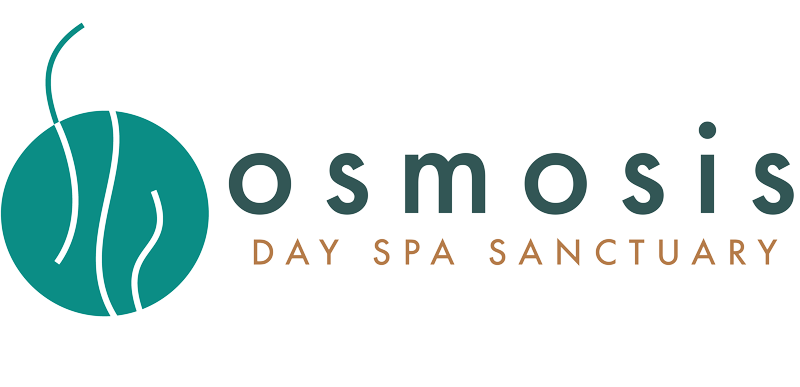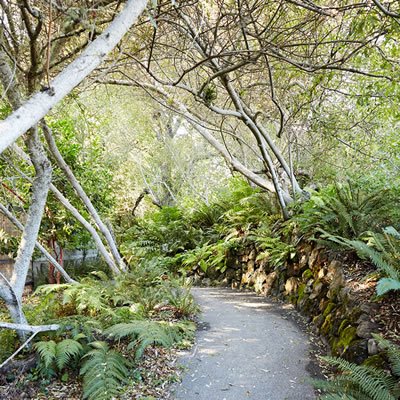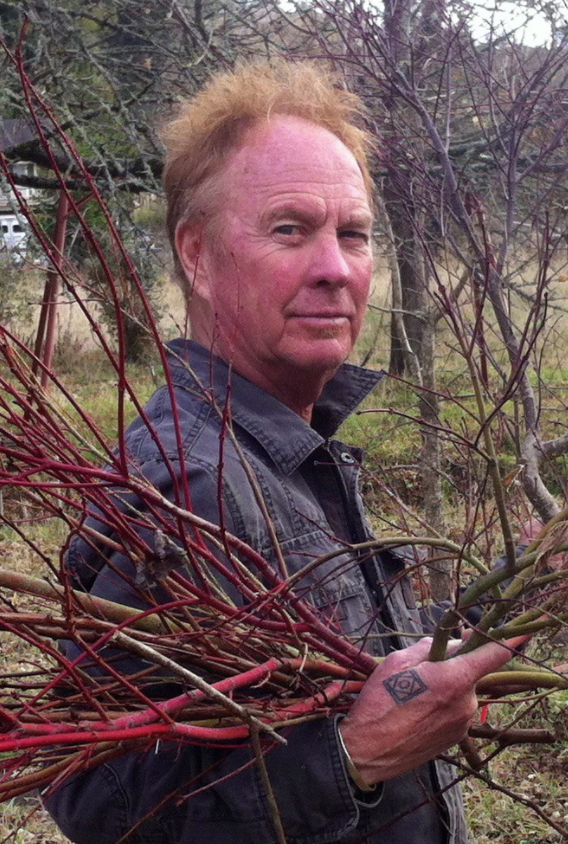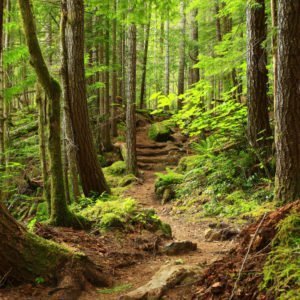How Osmosis Day Spa’s Authentic Approach to Rejuvenation Helps Guests Find Vitality Through a Connection to Nature & Community
The Crunch: The spa industry has grown as consumers become more focused on natural health and wellness. But, by marketing themselves as places for pampering and emphasizing beauty over wellness, many spas have strayed from their original purpose. Osmosis Day Spa offers guests an authentic experience that incorporates the meditation-inspiring traditions of Japanese gardening with the health benefits of the cedar enzyme bath to deliver total rejuvenation. Through its community involvement and sustainability efforts, Osmosis Day Spa strives to educate and restore the connection between personal and environmental wellness.
Spas are known as places for relaxation and escape from the stresses of modern life, practices that have become scarce in both consumer and corporate culture.
Over the last several years, Americans have become more conscientious about taking better care of their bodies through natural foods and products, exercise, and holistic health care. And the day spa industry has grown in response. In 2017, Americans made 184 million visits to spas — up from 176 million the previous year.
But, as spa businesses seek to attract more clients with an array of youth-preserving and beautification services, the predominant marketing message consumers hear is that spas are more about vanity and luxury than a quest for fundamental vitality.
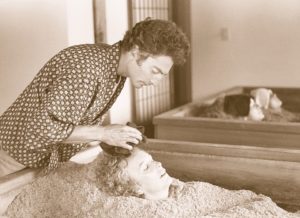
Michael Stusser founded Osmosis Day Spa Sanctuary to create a place of nurturing services in resonance with nature.
Michael Stusser, Founder of the Osmosis Day Spa, believes that catering to a sense of vanity rather than a desire for well-being misconstrues the purpose of spas and fails to meet the true needs of their clientele.
“When you talk about what represents authenticity, one of the biggest disservices to our industry is the use of the word ‘pampering’ in advertising. It’s a term that doesn’t capture the sincerity and quality of the work that many people are committed to doing with massage,” Michael said. “We have a responsibility to step up and provide something much more substantial — and people want it.”
Located in the tranquil, historic town of Freestone, California, Osmosis Day Spa weaves together Michael’s studies in Zen gardening and traditional therapies to offer the wholly rejuvenating experience spa guests are looking for.
“What we’re about is the sincere act of giving from the heart — something that’s deep, profound, and makes a difference in people’s lives,” Michael said.
From its carefully landscaped gardens to the healing properties of its cedar enzyme baths to its gifted, dedicated staff to its sustainability efforts and community involvement, Osmosis Day Spa helps guests recenter and revitalize through simplicity and serenity.
Bringing the Healing Power of Nature and Japanese Culture to the US
During Michael’s time at the University of California, Santa Cruz, in the 1960s, he developed an interest in environmentalism and sustainable gardening. His later involvement in the horticultural community of Northern California laid the groundwork for an understanding of the role of nature in fostering wellness and vitality.
“I began to recognize that gardens were about more than soil-building, food, and diet leading to a healthy lifestyle. Gardens put people in connection with the rhythms of nature, and that has a healing property to it,” Michael said.
Another quality Michael recognized in gardens is their ability to feed the eyes — and the soul — with natural beauty. “Garden art lifts people’s eyes to the horizon, creating a sense of connection to distance and time, and a perspective of longevity, which is an aspect of what draws people to spas. Being attuned to nature brings vitality, a core component of wellness,” Michael said.
The lessons Michael learned from gardening played a significant role in the development of Osmosis Day Spa, and remain an important part of its core values.
In the early 1980s, Michael traveled to Japan, where he apprenticed in traditional Japanese gardening and became immersed in its history and its ties to Zen meditation. He also spent time in a Buddhist monastery, where he discovered the benefits of the cedar enzyme bath.
Michael returned to the US with a desire to share this knowledge with others, and he chose his former home of Freestone, California — a historic rural community with a rich artisan culture that sees thousands of tourists every year — to be the home of Osmosis Day Spa.
“When I thought about where I wanted to bring it, it seemed natural to come back here. It’s removed from the hustle and bustle, and the natural beauty is exquisite,” Michael said. “Quietude is an important element in the healing process.”
Since founding Osmosis Day Spa in 1985, Michael has seen massage and other spa therapies develop into professional art forms with growing receptivity and popularity, and his business has flourished along with the industry as a whole.
“People realize how important touch is to healing, stress reduction, and overall well-being,” Michael said.
Providing Guests with the Benefits of the Cedar Enzyme Bath & a Unified Spa Experience
Osmosis Day Spa’s menu of services includes massage, facials, and spa packages that combine garden views and tea service with aromatherapy and essential oil treatments. But the spa’s signature treatment is the cedar enzyme bath — for which Osmosis remains the exclusive North American destination.
The enzyme bath’s modern form dates to the 1940s — and it was popularized by Olympic athletes in 1972 — but it originates out of the centuries-old Japanese tradition of harvesting fruits, vegetables, and herbs in their prime and turning them into healing salves and tonics.
“When I first experienced the enzyme bath, I was healed from serious sciatica and felt my whole body transformed in a significant way,” Michael said. “It’s a very powerful cleansing and detoxification process.”
The bath combines three treatments into a singular experience: heat therapy, aromatherapy, and biologically active enzymes.
Michael had long been a fan of natural hot springs, and this heightened his appreciation for the therapeutic effects of heat — which include softening body tissue, dilating the cardiovascular system, opening pores, and inducing total-body relaxation.
But the cedar enzyme treatment doesn’t involve a tub of water. Instead, the medium is a powdery red substance comprised of ground-up evergreens.
“It’s fragrant with oils from the most aromatic cedar in the world, along with the other wood species we use,” Michael said. “Research on essential oils has shown cedar to be one of the most efficacious in aromatherapy, with benefits such as deep relaxation. When you lay in a cedar enzyme bath, your entire body receives these vapors released in the steam of the fermentation process.”
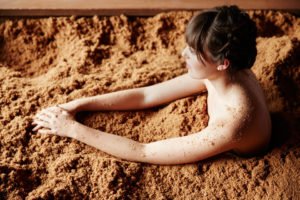
The cedar enzyme bath provides a warm, familiar, rejuvenating experience for Osmosis Day Spa guests.
When guests enter the cedar enzyme bath, they find it familiar — yet hard to describe. “They say, ‘Oh, this is what it is.’ There’s something fundamentally familiar to it,” Michael said.
The cedar enzyme bath experience encourages whole-body relaxation and heightened awareness of one’s self and surroundings, and Osmosis Day Spa strives to evoke this response during the entirety of a guest’s stay.
“Our entire facility — the way we hire and train our staff, the way the parking lot is laid out, the way the walkways lead to the building, the way the gardens are built — is intended to bring people to that point from the minute they drive up,” Michael said.
Osmosis Day Spa’s five acres of Zen gardens — including the meditation garden by premier designer Robert Ketchell, the British horticulturist who interned with Michael in Kyoto, inspire communion with nature. The spa also features a Japanese tea garden, secluded pagodas, a Field of Hammocks, and intimate outdoor meeting spaces.
“The gardens have been designed to create a connection to a place that has a sense of unity and cohesion,” Michael said. “Our meditation garden is a huge conductor of quietude and tranquility that people are especially receptive to after they’ve had a spa treatment.”
Connecting to the Community to Foster Environmental Awareness
Connection is a core value of Osmosis Day Spa, and this inspires its involvement in the community of Freestone and beyond.
Osmosis Day Spa partners with local businesses to provide guests with access to lodging for overnight stays, restaurants, and area tourist activities. It also directly supports many community organizations and projects — especially those that teach the value of healthy living and environmental stewardship.
“Being a part of the community is an important aspect of our work and our story,” Michael said. “We’ve collaborated with our neighbors to improve the water system in our town, and we’ve also worked with some nonprofits to support them and create awareness.”
One of the ongoing projects Osmosis Day Spa supports is the Ceres Community Project, in which nutritionists and chefs teach teens about nutrition, cooking, and local sourcing. The food they make is distributed to families suffering life-threatening illnesses. Osmosis supports Ceres by donating the profits from the box lunches it offers to guests.
“A local farm-to-table restaurant provides the lunch at cost, and the markup is given to the Ceres Community Project,” Michael said.
Ten years, ago, Michael also played a key role in starting the Green Spa Network — a collection of businesses from around the US that work together to help the spa industry set an eco-friendly example.
“We’re trying to function as a nexus in our community to inform, educate, and provide experiences that will help awaken them to what it means to live a vital, earth-friendly lifestyle,” Michael said.
Creating an Experience that Awakens People to Care About Themselves & Their Surroundings
In an industry that often markets to consumers’ obsession with aesthetic beauty and youthfulness, Osmosis Day Spa stands out for its authentic approach and a focus on total-body wellness that awakens not only self-awareness but also consciousness of one’s world.
Spas are places where people make themselves vulnerable, and Michael believes the industry is in a position to have more than a superficial impact on people’s health and lifestyles.
“People are coming to spas looking to transcend a lifestyle that’s not sustainable and to align with something more substantial than these paradigms of excessive consumerism,” Michael said. “They’re opening themselves up and trusting they’ll be gifted something of tremendous value. There’s so much opportunity, given what we could be doing as an industry, to help influence the direction of our culture.”
Osmosis Day Spa provides a place where people can relax and rejuvenate, learn how to take care of themselves, and reconnect to the most important things in life.
“We’re more than just a day spa selling a menu of services — we’re recognized as a source for valuable information and guidance on how to improve the potential of one’s life,” Michael said. “We’re making that connection between vital people and vital planet. They go hand in hand.”
